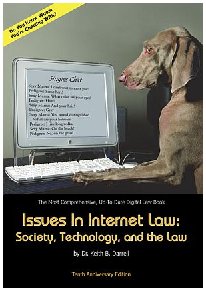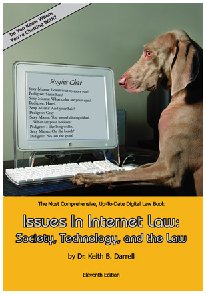Some businesses are getting a bit too nosey lately. Take
Toys “R” Us and Intuit (maker of TurboTax and Quicken software), for example.
The way these two businesses have invaded my privacy this week is downright
creepy.
I returned a purchase of a $4
item to Toys “R” Us and the woman at the Return Desk insisted on seeing my
identification. She wasn't asking for the credit card I had used to charge the
purchase; no, she wanted to see my driver’s license. “Why do you need to see my
driver’s license to return a $4 item? Isn't the receipt enough?” I asked.
“Store policy,” she replied, as if that catchall phrase justified the invasion
of my privacy. I flipped open my wallet and showed it to her. That didn't
satisfy her. With the attitude of the power drunk TSA agent, she insisted I
take it out of the plastic and hand it to her.
“I don’t want to be placed on any
mailing lists,” I told her, as she set my driver’s license atop her terminal.
“You won’t be,” she assured me, as I watched her fingers type my name, address,
and ZIP Code into her computer. I glanced at the screen and saw my name and
address, as they appeared on my driver’s license, now on the computer screen.
“I need your phone number, also,” she insisted. “No, you don’t,” I replied. “As
I said, I don’t want to be on your mailing list.” “Oh, we don’t do that sir, but I still need your phone number.”
“Why do you need my phone number?” I asked. “Store policy,” she replied.
Now, it takes a lot of chutzpah
to stand in front of me and lie to my face. When I was a kid, we had a saying:
Don’t piss in my face and tell me it’s raining. That’s adding insult to injury.
So I won’t be shopping at Toys “R” Us again, and I advise you not to, either.
At least Intuit doesn't tell you
it’s raining. In fact, Intuit doesn't tell you anything at all. After you
install its personal or business TurboTax software, the program spies on you
and reports back to Intuit. Specifically, Intuit wants to know:
1. The date you installed
TurboTax.
2. Your computer
information, for example: computer model, amount of memory, hard disk space and
screen resolution, versions of the operating system and its
components. Also, as required by the IRS for fraud protection purposes, we
will collect and send to the IRS the serial no and UUID from your
machine. We do not collect or share your user ID, password, files,
documents or list of other programs that you might have.
3. When and how you checked
for TurboTax updates.
4. When you started on your
tax return.
5. When and in which order you completed Personal
Info, Federal Taxes, State Taxes and Review sections of your tax return. Note
that we will not collect what you actually typed in.
6. Whether you printed or electronically filed (efile) your return.
Something else Intuit doesn't
tell you is that you can choose not to allow it to collect this information by
checking the default check mark, under the Privacy tab, in the Help section of
the software program (in the basement of City Hall along with plans to demolish
Arthur Dent’s house). Now you know.
Intuit was already in hot water
for downgrading features of its TurboTax software without informing its users.
Customers who purchased TurboTax Deluxe paid the same price they had the
previous year but discovered certain forms (for example, those for stock
transactions) were no longer included in the Deluxe version and that they would
have to upgrade to the Premier version at an additional cost. Meanwhile,
customers who paid $159 for Intuit’s top-of-the-line business tax software may
have been surprised to find they would have to pay extra for their state tax
preparation, or that it generated Form 1099-Div for recipients but not for the
IRS. Intuit did manage to beat out Comcast for Worst Customer Service Experience,
a remarkable feat: I spent two hours and 35 minutes on hold with Intuit before
my cell phone battery died. But I digress. So I won’t be buying TurboTax again,
and I advise you not to, either.















































No comments:
Post a Comment